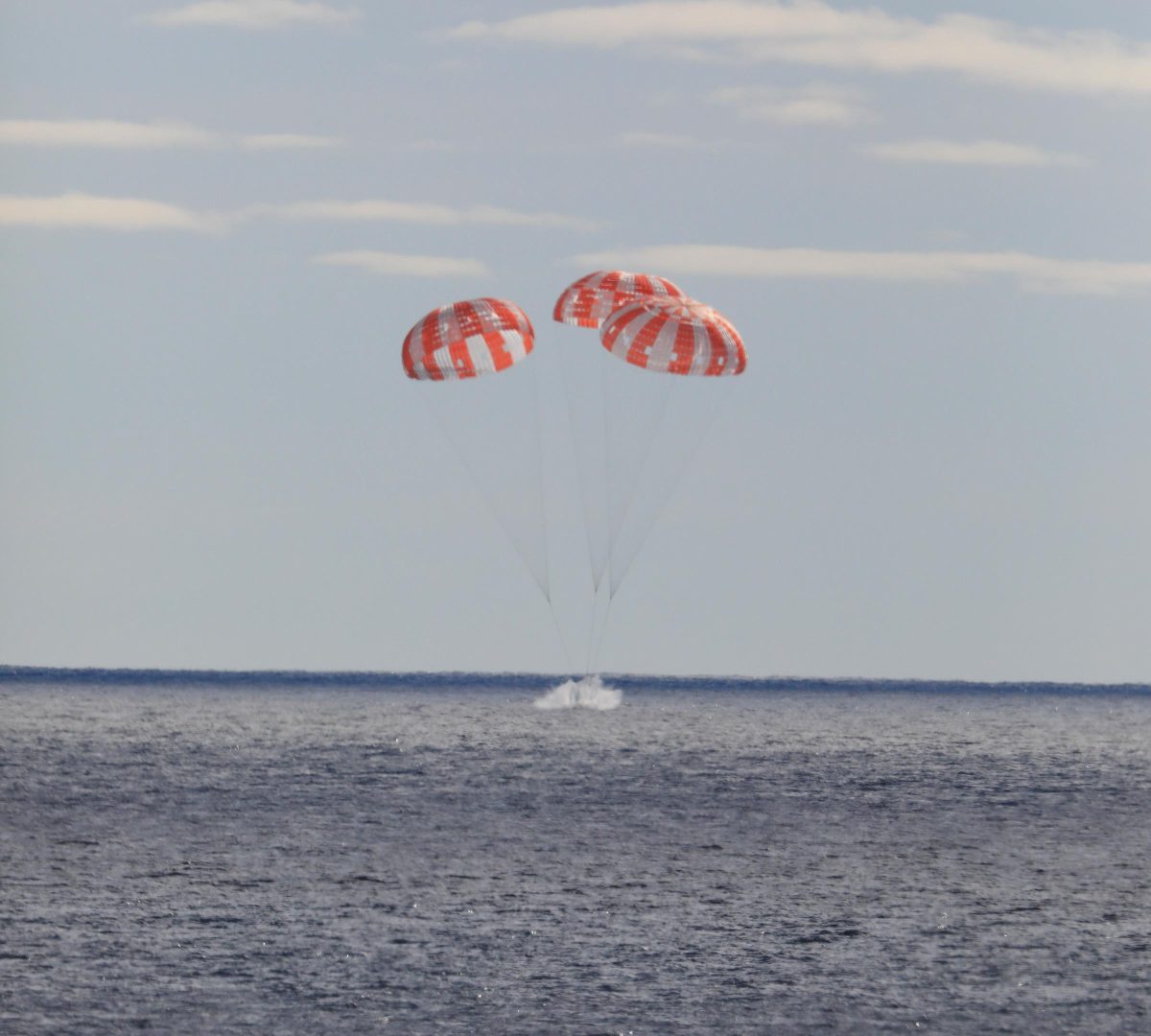At 12:40 p.m. EST, Dec. 11, 2022, NASA’s Orion spacecraft for the Artemis I mission splashed down in the Pacific Ocean after a 25.5 day mission to the Moon. Orion will be recovered by NASA’s Landing and Recovery team, U.S. Navy and Department of Defense partners aboard the USS Portland. Credit: NASA/Kim Shiflett
At 9:40 a.m. PST, 12:40 p.m. EST, NASA’s Orion spacecraft successfully completed a parachute-assisted splashdown in the Pacific Ocean as the final major milestone of the Artemis I mission. Engineers performed several additional tests while Orion was in the water and before powering down the spacecraft and handing it over to the recovery team aboard the USS Portland.
At 12:40 p.m. EST, December 11, 2022, NASA’s Orion spacecraft for the Artemis I mission splashed down in the Pacific Ocean after a 25.5 day mission to the Moon. Orion will be recovered by NASA’s Landing and Recovery team, U.S. Navy and Department of Defense partners aboard the USS Portland. Credit: NASA
At the direction of the NASA recovery director, Navy divers and other team members in several inflatable boats approached the spacecraft. When Orion was ready to be pulled into the ship’s well deck at the waterline, the divers attached a cable, called the winch line, to pull the spacecraft into the ship and up to four additional tending lines to attach points on the crew module. The winch pulled Orion into a specially designed cradle inside the ship’s well deck and the other lines controlled the motion of the spacecraft. Once Orion was positioned above the cradle assembly, technicians drained the well deck and secured it on the cradle.

NASA’s Orion spacecraft for the Artemis I mission was successfully recovered inside the well deck of the USS Portland on December 11, 2022, off the coast of Baja California. After launching atop the Space Launch System rocket on November 16, 2022, from the agency’s Kennedy Space Center in Florida, Orion spent 25.5 days in space before returning to Earth, completing the Artemis I mission. Credit: NASA
Once aboard the vessel, teams took the spacecraft to U.S. Naval Base San Diego. They will soon return it to NASA’s Kennedy Space Center for inspection. Technicians in Florida will thoroughly inspect Orion, retrieving data recorded on board, removing onboard payloads, and more.
At 12:40 p.m. EST, December 11, 2022, NASA’s Orion spacecraft for the Artemis I mission splashed down in the Pacific Ocean after a 25.5 day mission to the Moon. Seen here is NASA’s Landing and Recovery team, U.S. Navy and Department of Defense partners recovering the Orion spacecraft aboard the USS Portland off the coast of California. Credit: NASA
Artemis I was the first integrated test of NASA’s deep space exploration systems – the Orion spacecraft, SLS rocket, and the supporting ground systems – and the first in a series of increasingly complex missions at the Moon. Through Artemis missions, NASA will establish a long-term lunar presence for scientific discovery and prepare for human missions to Mars.
NASA hosted a post-splashdown news conference.
Participants include:
Bill Nelson, NASA administrator
Jim Free, NASA associate administrator for the Exploration System Development Mission Directorate, NASA Headquarters
Vanessa Wyche, director, Johnson
Janet Petro, director, Kennedy
Mike Sarafin, mission manager, NASA Headquarters
Howard Hu, Orion Program manager, Johnson
Emily Nelson, chief flight director, Johnson
Melissa Jones, recovery director, Kennedy
Share your story or advertise with us: Whatsapp: +2347068606071 Email: info@newspotng.com





![Ondo election: ‘I’m not aware people bought votes on my behalf’ – Aiyedatiwa [VIDEO]](https://newspotng.com/wp-content/uploads/2023/01/Imo-PDP-in-shock-over-cancellation-of-Orlu-senatorial-primaries-218x150.png)



![Ondo election: ‘I’m not aware people bought votes on my behalf’ – Aiyedatiwa [VIDEO]](https://newspotng.com/wp-content/uploads/2023/01/Imo-PDP-in-shock-over-cancellation-of-Orlu-senatorial-primaries-324x235.png)




![Ondo election: ‘I’m not aware people bought votes on my behalf’ – Aiyedatiwa [VIDEO]](https://newspotng.com/wp-content/uploads/2023/01/Imo-PDP-in-shock-over-cancellation-of-Orlu-senatorial-primaries-324x160.png)
